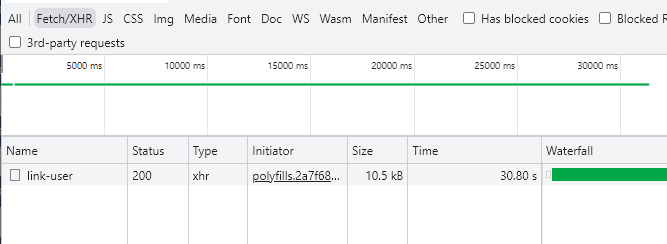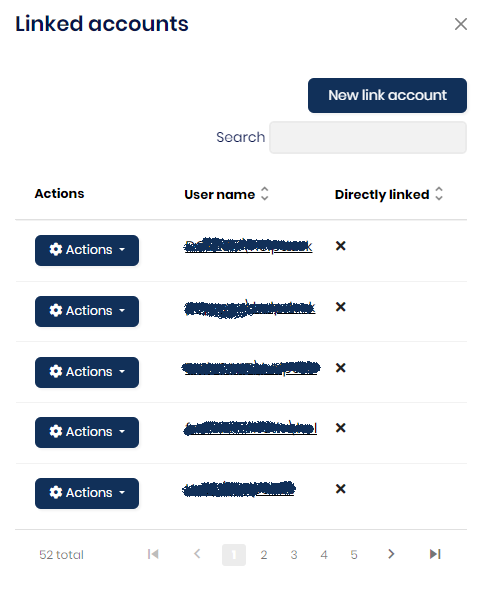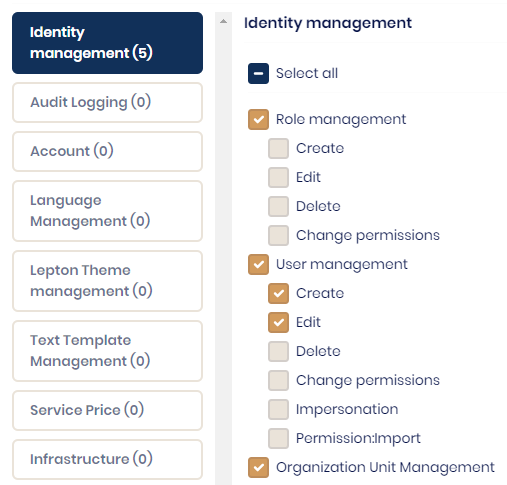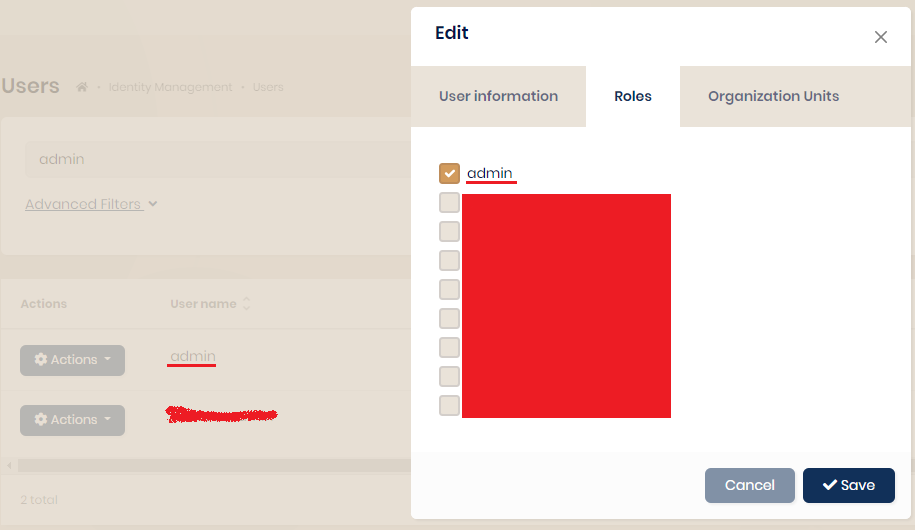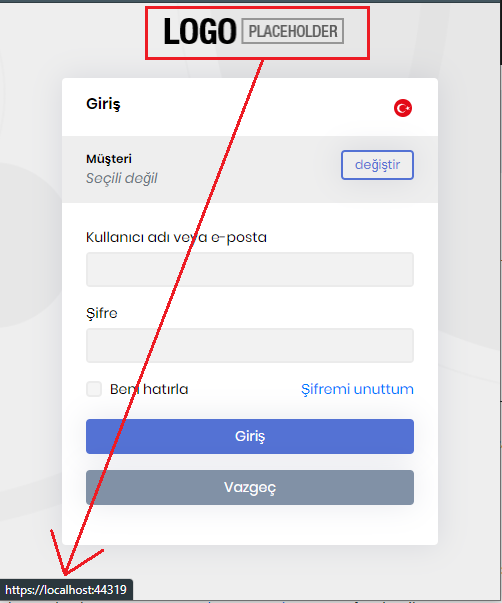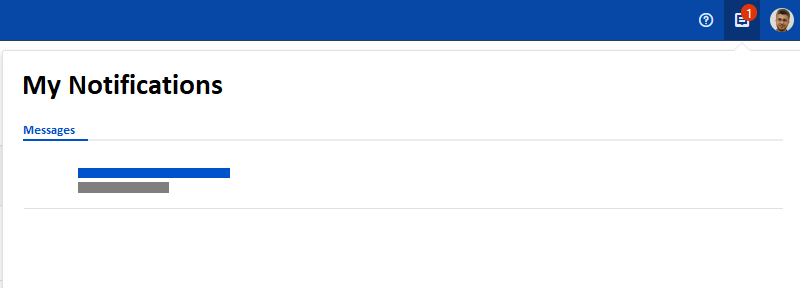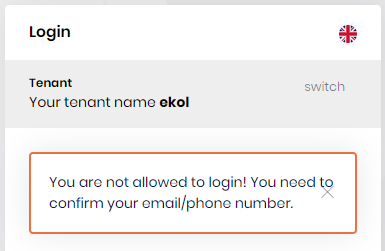Activities of "enes.koroglu"
- ABP Framework version: v5.3.3
- UI type: Angular
- DB provider: EF Core
- Tiered (MVC) or Identity Server Separated (Angular): no
- Exception message and stack trace:
- Steps to reproduce the issue:"
We are creating a support account, under every tenant and we are linking these accounts each other. Now we have aproximately 50 tenant and when we open Linked Accounts modal, it takes 30 seconds. This is really slow, if the number exceeds user gets timeout (so we removed some records to be able to open Linkend Accounts screen). I realised this endpoints gets whole records, not only selected page's records and also 50 records is not too much to take 30 seconds. I think there is a problem.
Check the docs before asking a question: https://docs.abp.io/en/commercial/latest/ Check the samples, to see the basic tasks: https://docs.abp.io/en/commercial/latest/samples/index The exact solution to your question may have been answered before, please use the search on the homepage.
If you're creating a bug/problem report, please include followings:
- ABP Framework version: v5.3.3
- UI type: Angular
- DB provider: EF Core
- Tiered (MVC) or Identity Server Separated (Angular): no
- Steps to reproduce the issue:"
I have some entities like below:
public class Order :AggregateRoot<Guid>
{
public string Name { get; set; }
public string Address { get; set; }
public ICollection<OrderLine> Lines { get; set; }
}
public class OrderLine:Entity<Guid>
{
public Guid ProductId { get; set; }
public Guid OrderId { get; set; }
public int Quantity { get; set; }
public Product Product { get;}
}
public class Product:AggregateRoot<Guid>
{
public string Name { get; set; }
public string Description { get; set; }
}
public class EfCoreOrderRepository : EfCoreRepository<CommonDbContext, Order, Guid>, IOrderRepository
{
public async Task<Order> GetWithNavigationPropertiesAsync(Guid id)
{
var query = from order in (await GetDbSetAsync()).Include(p => p.Lines).ThenInclude(s => s.Product)
where order.Id == id
select order;
return await query.SingleAsync();
}
}
I've added Product as a navigation property to OrderLine entity. But as we see in docs there is a section which says:
Do always reference to other aggregate roots by Id. Never add navigation properties to other aggregate roots.
- What is the main reason of this suggestion, could you please give more detail?
- If our way is wrong, how should we get Order/Lines and Product details on
GetWithNavigationPropertiesAsyncmethod.
- ABP Framework version: v5.3.3
- UI type: Angular
- DB provider: EF Core
- Tiered (MVC) or Identity Server Separated (Angular): no
- Steps to reproduce the issue:"
- Create a role named as role-supervisor.
- Give below grants (Picture 1) to role-supervisor.
- Assign role-supervisor to a user (supervisor).
This user can grant admin role to any user, or revoke admin role from any user as you can see in Picture 2. I want to create a role which can create/edit/lock/unlock user, assign/deassign roles to/from user. But i do not want the owner of this role to assign/deassign admin (or marked as special or private other roles) some other roles from/to users. There may be a solution like a new property for role as private. Define a new permission under Identity Management permission section for grant/revoke private role. Should be a new permission for grant/rekove private roles to any user. And owner of role-supervisor should not act on some private/special users.
- ABP Framework version: v5.3.3
- UI type: Angular
- DB provider: EF Core
- Tiered (MVC) or Identity Server Separated (Angular): no
- Exception message and stack trace:
We create appService methods with [UnitOfWork(true)] attribute.
Call our business related codes/methods and then make await CurrentUnitOfWork.SaveChangesAsync();
Then call one or more background job creation calls and when exit from appService methods ABP calls CompleteAsnyc method. In this stiuation if any error occurs (like below), background jobs are created and our operations are (on business related tables) rollbacked.
How can we make background job work in the same transaction with our business code; so it will not created or rolledback when we get any error on method completion (CompleAsync)
[ERR] The operation was canceled.
System.OperationCanceledException: The operation was canceled.
at System.Threading.CancellationToken.ThrowOperationCanceledException()
at Npgsql.Internal.NpgsqlConnector.<StartUserAction>g__DoStartUserAction|257_0(<>c__DisplayClass257_0& )
at Npgsql.Internal.NpgsqlConnector.StartUserAction(ConnectorState newState, NpgsqlCommand command, CancellationToken cancellationToken, Boolean attemptPgCancellation)
at Npgsql.NpgsqlTransaction.Commit(Boolean async, CancellationToken cancellationToken)
at Microsoft.EntityFrameworkCore.Storage.RelationalTransaction.CommitAsync(CancellationToken cancellationToken)
at Microsoft.EntityFrameworkCore.Storage.RelationalTransaction.CommitAsync(CancellationToken cancellationToken)
at Volo.Abp.Uow.EntityFrameworkCore.EfCoreTransactionApi.CommitAsync()
at Volo.Abp.Uow.UnitOfWork.CommitTransactionsAsync()
at Volo.Abp.Uow.UnitOfWork.CompleteAsync(CancellationToken cancellationToken)
at Volo.Abp.AspNetCore.Mvc.Uow.AbpUowActionFilter.OnActionExecutionAsync(ActionExecutingContext context, ActionExecutionDelegate next)
at Microsoft.AspNetCore.Mvc.Infrastructure.ControllerActionInvoker.<InvokeNextActionFilterAsync>g__Awaited|10_0(ControllerActionInvoker invoker, Task lastTask, State next, Scope scope, Object state, Boolean isCompleted)
at Microsoft.AspNetCore.Mvc.Infrastructure.ControllerActionInvoker.Rethrow(ActionExecutedContextSealed context)
at Microsoft.AspNetCore.Mvc.Infrastructure.ControllerActionInvoker.Next(State& next, Scope& scope, Object& state, Boolean& isCompleted)
at Microsoft.AspNetCore.Mvc.Infrastructure.ControllerActionInvoker.<InvokeInnerFilterAsync>g__Awaited|13_0(ControllerActionInvoker invoker, Task lastTask, State next, Scope scope, Object state, Boolean isCompleted)
at Microsoft.AspNetCore.Mvc.Infrastructure.ResourceInvoker.<InvokeNextExceptionFilterAsync>g__Awaited|26_0(ResourceInvoker invoker, Task lastTask, State next, Scope scope, Object state, Boolean isCompleted)
- Steps to reproduce the issue:"
[UnitOfWork(true)]
public async Task CreateAsync()
{
await productRepository.InsertAsync(new Product("Product1"));
await CurrentUnitOfWork.SaveChangesAsync();
await backgroundJobManager.EnqueueAsync(ProductJobArgs);
}
- ABP Framework version: v5.2.1
- UI type: Angular
- DB provider: EF Core
- Tiered (MVC) or Identity Server Separated (Angular): no
We use Distributed Event Bus via RabbitMQ to share data between two services which is also ABP project (v.4.4.4). v5.2.1 is publisher and v4.4.4 is subscriber.
We start v4.4.4 Project to create exchange and queues and to be sure we stop the project.
Then we create messages from 5.2.1 project and then queues and exchange created on rabbitmq.
We do this on test and dev environment.
Sometimes we create a message on test go to project2test as we expect, sometimes go to project2dev and sometimes message does not appear anywhere.
We tried true and false for useOutbox parameter and enabled outbox but nothing changed. We do not see any records on AbpEventOutbox on v5.2.1 publisher project.
RabbitMQ Generated Queues for environments and projects | Exchange | Queue | Environment | | --- | --- | --- | | project1testexch | project1test | test | | project1testexch | project2test | test | | project1devexch | project1dev | development | | project1devexch | project2dev | development |
AppSettings | project | environment | clientname | exchangename | | --- | --- | --- | --- | | project1 | test | project1test | project1testexch | | project2 | test | project2test | project1testexch | | project1 | dev | project1dev | project1devexch | | project2 | dev | project2dev | project1devexch |
- ABP Framework version: v5.2.1
- UI type: Angular
- DB provider: EF Core
- Tiered (MVC) or Identity Server Separated (Angular): no
- Steps to reproduce the issue:"
Register screen shows password rules on validation.
Although Language selected Turkish, Password should include a number, a capital, and a special character. message is still English.
In password reset page, password rule does not shown like registration screen. Only Submit button being disabled, but user cannot understand validation rule.
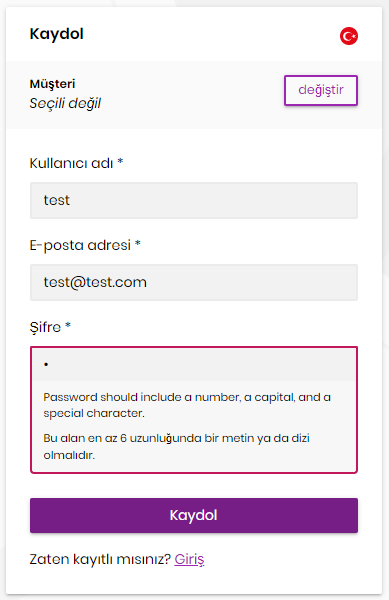
- ABP Framework version: v4.3.3
- UI type: Angular
- DB provider: EF Core
- Tiered (MVC) or Identity Server Separated (Angular): no
We need Entity Max and Min Length constants which we define in Domain.Shared\***Consts.cs files on Angular to be generated via generate-proxy. For now we should change same info both aspnet-core and angular projects every time when we make a change. Is there a way to generate this constants on Angular side via generate-proxy?
- ABP Framework version: v4.3.3
- UI type: Angular
- DB provider: EF Core
- Tiered (MVC) or Identity Server Separated (Angular): no
I see there is a related issue about this problem. Although I set RedirectAllowedUrls and tried with a new created project, click on LOGO in login page redirects to API. Below screen shot is belongs to new created test project. My web site logo also redirects to https://test-app.mydomain.com/ address. How can i redirect logo to my frontend (https://test-services.mydomain.com)
"App": { "SelfUrl": "https://test-app.mydomain.com", "AngularUrl": "https://test-services.mydomain.com", "CorsOrigins": "http://localhost:4200,https://.ekol.com,https://.mydomain.com", "RedirectAllowedUrls": "https://test-services.mydomain.com" }
- ABP Framework version: v4.3.0
- UI type: Angular
- DB provider: EF Core
- Tiered (MVC) or Identity Server Separated (Angular): no
- Exception message and stack trace:
- Steps to reproduce the issue:
We need a notification system for inform users about system related change or news like below image. There can be a badge between profile picture and in detail users can read and then (soft) delete (or not) messages. If messages read but not deleted by user, message should exists as read, if not read yet the badge should show number of unread messages and they should be identifiable as unread. If user wants; they should delete messages after read and after a period of time (this can be a parameter) read messages can be (soft) deleted.
Is it possible to add a feature like this.
- ABP Framework version: v3.3.1
- UI type: Angular
- DB provider: EF Core
- Tiered (MVC) or Identity Server Seperated (Angular): no
We have closed self user registration from Settings>>Account>>Enable self registration And then set, require mail confirmation true from Settings>>Identity Management>>SignIn Settings>>Require confirmed email
But after creating a new user from Identity Management>>Users or via below code, confirmation mail does not arrive:
private readonly IdentityUserManager userManager;
await userManager.CreateAsync(user, password);
But login screen says You are not allowed to login! You need to confirm your email/phone number.
We are curios especially about how to trigger Confirmation Mail after userCreation via code?
I think in the above Login screen, there should be a retrigger Confirmation Mail button or someting like that. A scenario can be like that: after email address is changed by user and then email address gets not validated but if this time user logged out or his session expired he cannot logged in anymore and gets You are not allowed to login! You need to confirm your email/phone number. error again.
After creating a new user via code or ui we want to reset user's password and ask a new password after login. Is this a scenario which abp covers, how can we do this?
